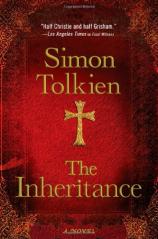The Inheritance
Review
The Inheritance
Simon Tolkien shares a literary lineage passed on from his grandfather, J. R. R. Tolkien, creator of the famous Lord of the Rings trilogy, and his father, Christopher Tolkien, who continued his own father’s Middle Earth saga with several additional volumes. The youngest Tolkien has bravely carved out his own literary path by writing novels not based in fantasy worlds or featuring mythical creatures, but that deal with very human subjects involved in thrilling legal dramas and peril.
With his second novel, Tolkien has built upon the acclaim he received from his debut, FINAL WITNESS. The prologue of THE INHERITANCE takes place in the French region of Normandy in 1945 during the height of World War II. It is there where we witness three British officers ravaging a French family and their servants, all in the guise of obtaining a priceless book that they learned was kept in their home. After murdering the family in cold blood and burning their house to the ground, the officers ensure that their heinous acts are blamed on the Nazis who had been harboring themselves inside the house.
The story then turns to the year 1959 and opens with the murder of a famed Oxford historian named Colonel Cade. The crime itself is not as shocking as the fact that his eldest son, Stephen, has been arrested and charged with the slaying. Stephen claims innocence throughout and insists he discovered his father’s body. Readers will immediately be aware of the infamous backstory involving the three British soldiers, the leader of whom was none other than Colonel Cade. Stephen had been estranged from the Colonel after he found out about his part in the murderous cover-up. But was that enough to make him want to take his own father’s life?
Tolkien parades a host of potential suspects, along with numerous motives and double-crosses thrown in, to keep the plot moving and the reader guessing. It turns out that the book Colonel Cade and his two comrades --- Ritter and Carson --- took from the house was the Codex of Marjean. This priceless artifact, when properly decoded, was purported to give the location of one of the rarest religious pieces in history --- the Cross of St. Peter. With the introduction of each backstory and plot element, the motives for murder become far more complex than a simple court case can uncover.
While Stephen is being set up nicely by British prosecutor Thompson, an inspector by the name of Trave makes it his mission to prove Stephen’s innocence by conducting his own investigation. Trave quickly discovers that the murder could have risen out of a simple case of family jealousy --- Stephen was in line to inherit the Codex of Marjean from his father, and obviously this would not sit well with younger brother Silas. The murderer could also have been another treasure hunter vying for the priceless artifact with dreams of using it to find the Cross of St. Peter. Lastly, it could have been a case of straightforward revenge against Colonel Cade for the murder of the innocent French family back in 1945.
While the straight narrative of the court case continues to depict the railroading of Stephen Cade for his father’s murder, Tolkien deftly uncovers other character lines that cloud things considerably and make it difficult to decipher who the actual murderer is. All Inspector Trave knows is that Stephen is about to be found guilty and will summarily be hanged not long after the inevitable sentence is handed down. It is a literal race against the clock as Trave digs deeper into the dark past of the Colonel and finds that all paths lead to the small town in France where there are still many buried secrets to be uncovered.
One critic called Simon Tolkien’s first novel “half Christie and half Grisham.” With THE INHERITANCE, I can concur with half of that assertion. It definitely has the feel of a classic Agatha Christie, and I found a lot of similarity to her novel/play WITNESS FOR THE PROSECUTION. Like a traditional Christie play, THE INHERITANCE is written in three acts, and the denouement revealed in the final act will definitely stun even the more experienced mystery reader. Combining elements of a classic whodunit with those of a legal thriller and the currently popular historical-based fiction, Tolkien has created a winner of a novel that succeeds on all levels and makes for an exciting read.
Reviewed by Ray Palen on January 22, 2011





